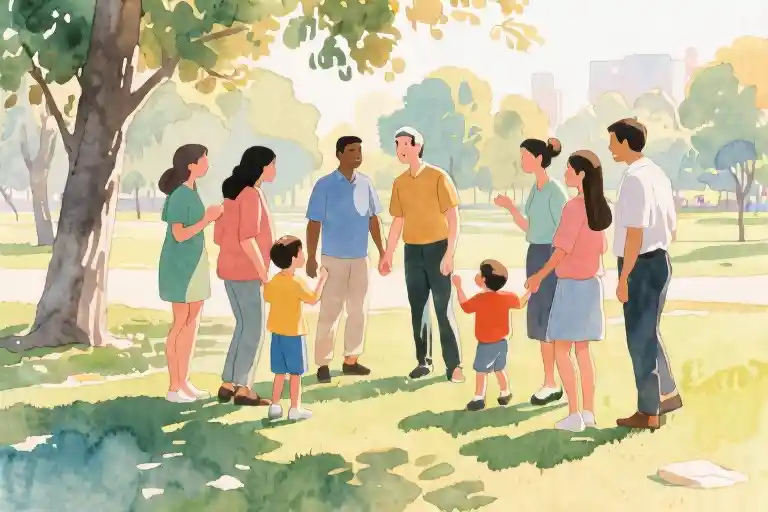I’ve lost count of how many times I’ve read those Bible verses about caring for orphans – the ones that talk about pure religion being to look after them in their distress. Yet when I’ve walked past children holding cardboard signs at intersections or seen news reports about foster care shortages, I’ll confess… I’ve often looked the other way.
Perhaps you know that uncomfortable feeling too? That quiet guilt when you flip past the orphanage fundraiser envelope in your church bulletin or change the channel when the commercials show those sad-eyed children. We know we should help, but between work, family, and everyday responsibilities, the problem feels too enormous. And if adoption or foster care isn’t an option for your family right now, it’s easy to think there’s nothing meaningful you can do.
But here’s what I’ve come to understand: helping orphans isn’t an all-or-nothing proposition. The Bible’s call to “defend the fatherless” (Isaiah 1:17) comes in many forms beyond adoption. Whether it’s war orphans halfway across the world or kids in your own community removed from unsafe homes, there are practical ways we can answer that call – starting today.
My own family history makes this deeply personal. Both my father and grandfather grew up as orphans. That black-and-white photo of my dad as a boy, standing alone in a threadbare coat outside the orphanage gates, reminds me these aren’t abstract statistics – they’re children with stories waiting to be rewritten. When we talk about 140 million orphans globally (UNICEF’s latest estimate), we’re really talking about 140 million individual lives like my father’s – each needing someone to step in where parents couldn’t.
The crisis wears different faces in different places. In some countries, it’s children who’ve lost parents to war or AIDS. In our neighborhoods, it might be kids entering foster care because of parental addiction or incarceration. What unites them is this: they all need the protection and care God commands us to provide. And here’s the hopeful truth – whether through giving, volunteering, advocating, or simply paying attention, every one of us can be part of that answer.
Why Do We Turn Away from Orphans?
I’ve lost count of how many times I’ve read James 1:27 – “Religion that God our Father accepts as pure and faultless is this: to look after orphans and widows in their distress.” The words are familiar, almost comfortable in their biblical rhythm. Yet when I pass a child in the foster system or see statistics about global orphan crises, I find myself looking away. My Bible stays open, but my heart closes just a little.
Perhaps you know this tension too. That quiet guilt when the sermon touches on orphan care. The quick scroll past social media posts about foster children. The mental justification – “I can’t adopt right now” – that somehow absolves us from any responsibility. Research suggests 70% of Christians believe they should help orphans but haven’t taken concrete steps. We’ve created what psychologists call the “guilt-avoidance cycle”:
- Awareness: We recognize the biblical mandate
- Overwhelm: The scale of need feels crushing (153 million orphans worldwide)
- Rationalization: “Since I can’t solve it all, I’ll do nothing”
- Guilt: Which leads back to avoidance
This gap between Scripture’s clear teaching and our inaction isn’t just about busy schedules or financial limitations. It’s often about unspoken fears – of emotional overwhelm, of not knowing where to start, or of making a lifelong commitment when we feel unprepared. Yet the Bible never presents orphan care as an all-or-nothing proposition. From the Israelite practice of gleaning (Leviticus 19:9-10) to the early church’s daily distribution (Acts 6:1), God’s people have always found ways to share the burden.
What if we reframed the question? Instead of asking “Can I adopt?” – which for many may genuinely not be feasible – we asked “How can I participate in God’s care for orphans today?” The answer might surprise you with its accessibility.
Key Thought: Our responsibility isn’t to solve the entire orphan crisis, but to respond to the part God places before us. As researcher Dr. Karen Purvis observed, “It’s not about perfect families helping broken children, but about broken families helping each other.”
The Orphan’s Reality: From War Zones to Your Neighborhood
A Global Crisis Closer Than We Think
The statistics are staggering yet often abstract—until you realize these numbers represent real children with names and dreams. According to UNICEF, approximately 140 million orphans exist worldwide, yet only 20% lost parents to death. The remaining 80% are victims of what we might call ‘living losses’—families fractured by addiction, incarceration, abuse, or systemic poverty. In my home state alone, over 5,000 children entered foster care last year due to parental drug use. That’s 5,000 school classrooms where someone’s chair sits empty during family events.
When ‘Orphan’ Doesn’t Mean Parentless
My grandfather’s 1930s orphanage records listed him as ‘half-orphaned’—a bureaucratic term for children with one living parent unable to care for them. His mother, widowed during the Great Depression, worked fourteen-hour days at a textile mill while he slept on a cot in a facility where winter frost painted the dormitory windows. This reality persists today:
- War zones: Syrian refugee camps where children teach themselves to read using bullet casings as counting tools
- Suburban America: A second-grader removed from her home after teachers noticed methamphetamine burns on her arms
- Scripture’s lens: James 1:27’s “orphans in their distress” includes all vulnerable children, regardless of technical parent status
The Face Behind the Statistics
My father’s childhood photograph tells the silent part of this story—a boy in patched overalls holding his only possession (a wooden toy truck) outside the orphanage gates. What the image doesn’t show:
- The local church members who secretly left shoes for him each winter
- The teacher who spent lunch hours teaching him multiplication tables
- The transformative power of small, consistent acts of help (what we’d now call ‘foster care alternatives’)
Why This Matters Now
Modern orphan crises compound historical challenges with new layers:
| Issue | Traditional Orphan Care | Current Reality |
|---|---|---|
| Primary Cause | Parental death | Family breakdown (75% cases) |
| System Capacity | Institutional care | Foster home shortages |
| Lasting Impact | Survival needs | Trauma-informed care gaps |
This shift means helping orphans increasingly requires addressing root causes like addiction recovery programs and family preservation services—areas where volunteers and donors create measurable change without adopting.
Your Invitation to See Differently
Next time you hear ‘orphan,’ don’t picture just a Dickensian figure. See:
- The teenager in your community aging out of foster care without life skills
- The Ukrainian child drawing pictures for a father they’ll never see again
- The potential within every waiting child when someone chooses practical orphan support
As my father often says, ‘Nobody plans to become an orphan—but we can plan how to respond.’ That planning starts with understanding the full scope of their world, from war-torn regions to the quiet struggles in our own zip codes.
5 Practical Ways to Change an Orphan’s Life (Without Adopting)
For many of us, the call to “care for orphans” (James 1:27) feels both urgent and overwhelming. We see the need, we feel the conviction, but the practical steps seem unclear—especially when adoption or fostering isn’t an option. Here are five meaningful ways to make a difference, each rooted in biblical principles and real-world impact.
1. Donate Essentials Through Trusted Organizations
Basis in Scripture: “Truly I tell you, whatever you did for one of the least of these… you did for me.” (Matthew 25:40)
How it works:
- Support vetted ministries like Show Hope that provide food, education, and medical care
- Sponsor a child’s schooling ($40/month covers tuition in many regions)
- Organize a diaper/winter coat drive through your church
Success story: A $50 donation to “Orphan’s Promise” equipped 12-year-old Maria in Honduras with vocational training—she now runs a small bakery supporting her siblings.
2. Volunteer Through Local Foster Care Programs
Basis in Scripture: “Whoever is kind to the poor lends to the Lord.” (Proverbs 19:17)
How it works:
- Become a “Friday Friend” to babysit foster kids so parents get respite
- Tutor children at group homes (1-2 hours/week makes academic impact)
- Offer pro bono services (e.g., haircuts, photography for adoption profiles)
Success story: Retired teacher Mr. Johnson spent Tuesdays reading at a group home—within a year, 80% of kids improved their literacy scores.
3. Teach Marketable Skills Remotely
Basis in Scripture: “Each of you should use whatever gift you have to serve others.” (1 Peter 4:10)
How it works:
- Lead virtual workshops via platforms like Engage (coding, English, trades)
- Create YouTube tutorials with life skills (budgeting, resume writing)
- Donate used laptops to tech training programs
Success story: Software engineer David taught Python to teens in Uganda—three now work remotely for African tech startups.
4. Advocate for Policy Changes
Basis in Scripture: “Speak up for those who cannot speak for themselves.” (Proverbs 31:8-9)
How it works:
- Email legislators using pre-written templates from Christian Alliance for Orphans
- Share foster care reform petitions on social media
- Host documentary screenings about orphan crises
Success story: A church group’s letter-writing campaign helped pass state funding for trauma counseling in foster care.
5. Host Through “Family for a Season” Programs
Basis in Scripture: “Share with the Lord’s people who are in need. Practice hospitality.” (Romans 12:13)
How it works:
- Welcome orphans for holiday breaks via Safe Families
- Provide summer housing for aged-out foster youth interning in your city
- Coordinate “birthday boxes” (cake mix, gifts) for children in care
Success story: The Thompsons hosted 16-year-old Carlos for Christmas—that temporary stability helped him graduate high school and secure a college scholarship.
Key Takeaway: You don’t need to adopt to obey God’s heart for orphans. Whether through donating, volunteering, teaching, advocating, or hosting, every action—no matter how small—writes hope into a child’s story.
From Guilt to Action: How Your Choices Write the Story
My father’s hands always carried the faint scent of chalk dust—a lingering reminder of his 40 years as a high school teacher. Few of his students knew those same hands had once clutched the cold iron bars of an orphanage crib, or that the man who patiently diagrammed sentences on blackboards had entered the foster system at age six after his mother’s sudden death. The boy who owned only one pair of shoes became the educator who secretly bought winter coats for struggling families, who sponsored three orphans through college, who proved that cycles of abandonment can be broken.
This is the hidden arithmetic of compassion: small, consistent acts multiplied over time create exponential change. You don’t need to adopt to alter an orphan’s trajectory—you simply need to show up where your life intersects with theirs. Here’s how your story could rewrite theirs:
3 Immediate Ways to Cross the Gap Between Knowing and Doing
- Fund a Future ($10 = 1 Week of Hope)
- “Whoever is kind to the poor lends to the Lord” (Proverbs 19:17)
- Partner with vetted organizations like Show Hope where 92% of donations directly fund orphan care. Your coffee money could provide:
- $10 → School supplies for 1 child
- $25 → Medical checkups for 3 babies
- $100 → Trauma counseling sessions
- [Embedded donation button with “Give Today” call-to-action]
- Amplify Their Voice (30 Seconds That Matter)
- “Speak up for those who cannot speak for themselves” (Proverbs 31:8)
- Share this article with your Bible study group using our pre-written caption:
“Just learned 5 practical ways to help orphans without adopting—including how our church can get involved. Who wants to explore this together?” [Social media icons with share links]
- Invest Presence (Your Ordinary Is Their Extraordinary)
- “Look after orphans… in their distress” (James 1:27)
- Sign up for local volunteer opportunities like:
- Reading bedtime stories at group homes (1 evening/month)
- Teaching life skills (cooking, budgeting) to aging-out teens
- Becoming a “holiday host” for foster kids during school breaks
The Ripple You Can’t See Yet
When my father graduated from college—the first in his orphanage cohort to do so—his childhood housemother pressed a $5 bill into his palm. That widow’s “mite” funded his teaching certificate application. Today, his former students include nurses, pastors, and yes, adoptive parents. One thread of kindness wove through generations.
Your action today—whether clicking “share,” scheduling a volunteer orientation, or sacrificing one takeout meal to donate—is that first stitch in a tapestry only Heaven will fully reveal. As the chalk dust of my father’s legacy reminds me: Not everyone can adopt, but everyone can help.





